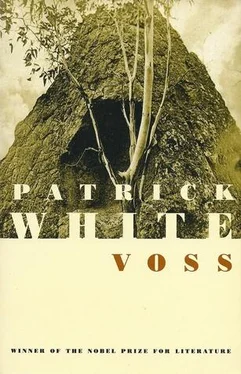‘I was thinking of taking the gun down to the river, to look for a few duck that I saw making that way. Will you come, Frank?’ he now asked.
He wanted to kill something.
The young man agreed to come, rolled over, and grabbed for his hat. In the folds of the blanket there was no sign of the notebook that both knew to be there.
So they went down to the river, which had almost dried since the last rain. A brown heat was descending like a flat lid. Jildra, with its squalid pleasures of black flesh and acres of concealed wealth, was reduced to a panful of dust and stinking mud, in which Brendan Boyle himself had chosen to stick.
Once during those days, the latter approached Voss and almost asked to take part in the expedition, as if death in unpredictable circumstances were suddenly preferable to slow rotting.
Instead, they discussed water-bags.
This man has a favour to ask, the German knew, and in consequence grew wily. All, sooner or later, sensed his divinity and became dependent upon him. There was young Ralph Angus, Sanderson’s grazier-neighbour, blushing like a girl to ask an opinion. The armour of youth and his physical strength had not protected him against discovery of his own ignorance during the journey north. Turner was abject, of course, and Harry Robarts an imbecile. But Angus might prove a worthy sacrifice. The young bull of pagan rites, he would bellow and cast up his brown, stupid eyes before submitting.
Of all the company, Judd remained least changed. Voss was encouraging, but amused. The day he found the convict tarring a horse’s swollen pastern, the German’s upper lip was as long in amused appreciation as a hornet is in legs. He looked at the stooping man, and said:
‘Is it a solution you are putting, Mr Judd?’
‘It is,’ replied the latter, chasing some insect away from his face with his tar-free arm.
‘You have not omitted the oil?’ asked Voss.
‘No,’ said Judd.
Voss was whistling a little tune of insect music.
‘That is excellent,’ he said.
He continued to whistle until, Judd could feel, he was drifting on. Then the convict’s empirical nature was glad of the stench of tar, and the heat which was for ever descending and ironing the dust still flatter.
Heavy moons hung above Jildra at that season. There was a golden moon, of placid, swollen belly. There were the ugly, bronze, male moons, threateningly lopsided. One night of wind and dust, there was a pale moonstone, or, as rags of cloud polished its face, delicate glass instrument, on which the needle barely fluttered, indicating the direction that some starry destiny must take. The dreams of men were influenced by the various moons, with the result that they were burying their faces in the pregnant moon-women, or shaking their bronze fists at any threat to their virility. Their dreams eluded them, however, under the indicator of that magnetic moon. The white dust poured out from between their fingers, as they turned and turned on hairy blankets that provoked their nakedness. On the other hand, there were some who lay and listened to their own eyelids grate endlessly.
Such was the predicament of Palfreyman on one particularly white night. Unable to sleep, he had passed the time reviewing houses in which he had lived, minor indignities he had suffered, and one tremendous joy, a white eagle fluttering for a moment on the branch of a dead tree and almost blotting out the sky with the span of its wings.
The sound of the strong feathers, heard again above the squeak of mice and groans of sleep in Boyle’s squalid shack, had almost freed the wakeful Palfreyman, when Voss rose. There he was, striped by moonlight and darkness, the stale air moving round him, very softly. Voss himself did not move. Rather was he moved by a dream, Palfreyman sensed. Through some trick of moonlight or uncertainty of behaviour, the head became detached for a second and appeared to have been fixed upon a beam of the wooden wall. The mouth and the eyes were visible. Palfreyman shivered. Ah, Christ is an evil dream, he feared, and all my life I have been deceived. After the bones of the naked Christ had been drawn through the foetid room, by sheets of moonlight, and out the doorway, the fully conscious witness continued to lie on his blanket, face to face with his own shortcomings and his greatest error.
But there was an end to this unhappiness, he was surprised to find. The moonlight returned Voss to the room. As he was moved back, his bones were creaking, and his skin had erupted in a greenish verdigris.
Palfreyman nearly put out his hand, to recall them both to their normal relationship, but was restrained by an access of cold.
Next morning he remarked:
‘Mr Voss, do you know you were sleep-walking last night?’
The German was engaged in putting on his socks, his backbone exposed to his accuser.
‘I have never been known to, before. Never,’ he replied, but most irritably, as if refusing a crime with which he had been unjustly charged.
Boyle, who had just then come through the partition, scratching an armpit, felt compelled to say:
‘We welcome you, Voss, through the gate of human weaknesses.’
And was glad at last. He remembered how the yellow woman had flattened her belly against him the other side of sleep.
But Voss was grumbling. He had grown livid. All that day he remained bones rather than flesh.
All his days were wasting away in precise acts. His feet were heavy with dust as he tramped between shed, tent, and stockyard. Now his distaste for men returned, especially for those with whom he had surrounded himself, or, to be more accurate, with whom an ignorant jackass had surrounded him against his will. Blank faces, like so many paper kites, themselves earth-bound, or at most twitching in the warm shallows of atmosphere, dangling a vertebral tail, could prevent him soaring towards the apotheosis for which he was reserved. To what extent others had entangled him in the string of human limitation, he had grown desperate in wondering.
So he was chewing his pen over that journal of acts and facts, which he did keep meticulously, he was holding a narrow oblong of clean, folded paper to protect the page from other eyes and dust, at the moment when Boyle came into the room, crunching over stale bread, smelling of sweat, and said:
‘Now, Voss, I do not want to meddle in anybody’s affairs, but I would suggest you are missing the best of a good season by delaying.’
‘Yes. Yes,’ said Voss, flicking at the page with the paper shield that he held between his long, clean bones of fingers. And frowning. ‘In two, three days we shall be prepared to leave. I have a report to write,’ he added.
‘I do not want to suggest you are in any way de trop ,’ said his host, and could have become sentimental, for anyone at all, even for this scraggy guest whom he did not understand, suspected, and at times had even disliked.
Boyle was not resentful. Of loving flesh, he could not have wished for better than a close companion on the same dung-heap, to sit beside, and touch.
‘Understand that, old man,’ he said, patting the German on the knee.
Voss frowned at the dust which had spurted through the open doorway and dirtied his clean paper. It was about sundown, and the blaze of light was blinding him.
‘I do not intend to inconvenience you above a day or two,’ he repeated.
With these words, spoken thus, for a second time, he realized that he was staking all. Thus, he could blame no one else for his own human weakness. He had delivered up his throat to the long, cold, glistening braids of her hair, and was truly strangling in them.
‘That is very reasonable,’ commented Boyle. ‘And Thorndike should be here by then. A black from Cubanong has just come in. Thorndike has arrived there. If they have sent up anything for you, as an afterthought, Thorndike will have it.’
Читать дальше












